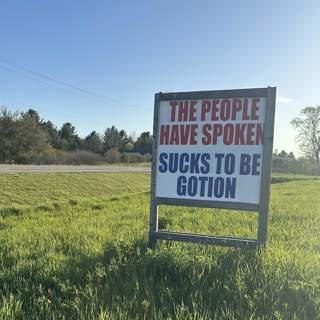
Jay & Shai's debt ceiling adventure (Update)
Note: A version of this episode first ran in 2023.Every year, the U.S. government spends more money than it takes in. In order to fund all that spending, the country takes on debt. Congress has the power to limit how much debt the U.S. takes on. Once we reach that limit, Congress has a few options so that the government keeps paying its bills: Raise the debt limit, suspend it, or eliminate it entirely. Which is daunting, because if lawmakers don't figure something out in time, the ramifications for the global economy could be huge. Shai Akabas, of the Bipartisan Policy Center, has become something of the go-to expert in calculating the exact date America would hit the wall and not be able to pay all its debts. This day is so terrifying it has a special name, the X-Date. Today's episode is about how Akabas and Jay Powell — long before he became chair of the Federal Reserve — worked to create a system to determine the X-Date with the hope of helping us all never reach it.We also have an update on this year's looming X-Date, which could arrive as soon as this summer. Find more Planet Money: Facebook / Instagram / TikTok / Our weekly Newsletter.Listen free at these links: Apple Podcasts, Spotify, the NPR app or anywhere you get podcasts.Help support Planet Money and hear our bonus episodes by subscribing to Planet Money+ in Apple Podcasts or at plus.npr.org/planetmoney.Learn more about sponsor message choices: podcastchoices.com/adchoicesNPR Privacy Policy
19 Juni 30min

Why I joined DOGE
What was it like to work inside Elon Musk's DOGE? The cost-cutting initiative promised transparency, but most of its actions have been shrouded in secrecy.For months, there were reports of software engineers and Trump loyalists entering agencies and accessing sensitive data. DOGE also helped the Trump administration lay off thousands of government workers. NPR reporters have been trying for months to get anyone from DOGE to talk on the record. Now, Sahil Lavingia, a former DOGE staffer assigned to the Department of Veteran Affairs, is speaking.Today, what drew Sahil to DOGE and what he learned about the inner workings, in a way we've never heard before.For more on DOGE and the federal workforce: - The last time we shrank the federal workforce - Can... we still trust the monthly jobs report? - Can the Federal Reserve stay independent?This episode was hosted by Kenny Malone and Bobby Allyn. It was produced by Sam Yellowhorse Kesler and Emma Peaslee. It was edited by Jess Jiang and fact-checked by Sierra Juarez. It was engineered by Neal Rauch. Alex Goldmark is Planet Money's executive producer. Find more Planet Money: Facebook / Instagram / TikTok / Our weekly Newsletter.Listen free at these links: Apple Podcasts, Spotify, the NPR app or anywhere you get podcasts.Help support Planet Money and hear our bonus episodes by subscribing to Planet Money+ in Apple Podcasts or at plus.npr.org/planetmoney.Learn more about sponsor message choices: podcastchoices.com/adchoicesNPR Privacy Policy
14 Juni 27min

Are Trump's tariffs legal?
When President Trump announced his sweeping new tariffs this year, many trade law experts were startled. Typically, presidents don't have the authority to impose broad tariffs with a snap of their fingers.But Trump's advisors have an unusual new legal theory. They say that as long as there's a national emergency of some kind, Trump may be able to create whatever tariffs he wants. This is a creative interpretation of a 1977 law called the International Emergency Economic Powers Act, or IEEPA. To justify his latest tariffs, the president declared national emergencies involving illegal immigration, the fentanyl crisis, and the trade deficit.But no president has ever tried to use the law in this way. Now, the fate of Trump's tariffs — and the creative legal theory behind them — lies with the courts. About a dozen lawsuits have challenged his tariffs, claiming that they are unlawful and possibly even unconstitutional. And some judges have started to agree.On today's show: What are the President's powers when it comes to tariffs? Where do they come from? What are their limits? And, what will be the fate of Trump's tariffs?For more on Trump's tariffs: - The 145% tariff already did its damage - Do trade deficits matter? - What "Made in China" actually meansFind more Planet Money: Facebook / Instagram / TikTok / Our weekly Newsletter.Help support Planet Money and hear our bonus episodes by subscribing to Planet Money+ in Apple Podcasts or at plus.npr.org/planetmoney.Learn more about sponsor message choices: podcastchoices.com/adchoicesNPR Privacy Policy
11 Juni 24min

When Chinese manufacturing met Small Town, USA
Over the past decade, politicians from both parties have courted American voters with an enticing economic prospect – the dream of bringing manufacturing and manufacturing jobs back to America. They've pushed for that dream with tariffs and tax breaks and subsidies. But what happens when one multinational company actually responds to those incentives, and tries to set up shop in Small Town, USA?Today on the show – how a battery factory ignited a political firestorm over what kind of factories we actually want in our backyard. And what happens when the global economy meets town hall democracy. This episode of Planet Money was produced by Emma Peaslee and Sylvie Douglis. It was edited by Marianne McCune and Jess Jiang. It was fact-checked by Sierra Juarez. It was engineered by Robert Rodriguez. Alex Goldmark is our executive producer.Read Viola Zhou's reporting on the Gotion battery factory.Find more Planet Money: Facebook / Instagram / TikTok / Our weekly Newsletter.Listen free at these links: Apple Podcasts, Spotify, the NPR app or anywhere you get podcasts.Help support Planet Money and hear our bonus episodes by subscribing to Planet Money+ in Apple Podcasts or at plus.npr.org/planetmoney.Music: NPR Source Audio - "Collectible Kicks," "Arturo's Revenge," and "Liquid Courage"Learn more about sponsor message choices: podcastchoices.com/adchoicesNPR Privacy Policy
6 Juni 31min

Trump's crypto interests (Two Indicators)
Today on the show – our crypto president. Just before President Donald Trump began his second administration in January, he and his business partners launched the $TRUMP coin. It's a memecoin that quickly raked in hundreds of millions of dollars. And there's a lot of earning potential still left on the table. Is that even legal?We bring you two stories from our daily show, The Indicator about President Trump and his ties to crypto. First, the Trump coin. We explain what it is, how the real Donald Trump profits from it, and yes, whether this whole crypto scheme is within the law. Then we take a look at Stablecoins: how they work, how they make money, and for whom.The original episodes from The Indicator were produced by Cooper Katz McKim and Corey Bridges. They were engineered by Harry Paul and Robert Rodriguez. They were fact-checked by Sierra Juarez. Kate Concannon edits the show. This episode of Planet Money was produced by James Sneed and edited by Emma Peaslee. Alex Goldmark is Planet Money's executive producer.Find more Planet Money: Facebook / Instagram / TikTok / Our weekly Newsletter.Listen free at these links: Apple Podcasts, Spotify, the NPR app or anywhere you get podcasts.Help support Planet Money and hear our bonus episodes by subscribing to Planet Money+ in Apple Podcasts or at plus.npr.org/planetmoney.Learn more about sponsor message choices: podcastchoices.com/adchoicesNPR Privacy Policy
4 Juni 18min

The U.S.-China trade war, according to game theory
Over the last few months U.S.-China trade relations have been pretty hard to make sense of – unless you look at what's happening through the lens of game theory. Game theory is all about how decisions are made, based not just on one side's options and payoffs, but on the choices and incentives of others.So, are Donald Trump and Xi Jinping competing in a simple game of chicken? Or is the game more like the prisoner's dilemma? On today's show, we try to decide which of four possibilities might be the best model for this incredibly high-stakes game. And we take a look at who is playing well and who might need to adjust their strategy.For more on the U.S.-China trade war: - The 145% tariff already did its damage - What happened to U.S. farmers during the last trade war - What "Made in China" actually meansThis show was hosted by Keith Romer and Amanda Aronczyk. It was produced by Sam Yellowhorse Kesler. It was edited by Jess Jiang, fact-checked by Sierra Juarez and engineered by Kwesi Lee with help from Robert Rodriguez and Cena Lofreddo. Additional production help from Sylvie Douglis. Alex Goldmark is Planet Money's executive producer. Find more Planet Money: Facebook / Instagram / TikTok / Our weekly Newsletter.Listen free at these links: Apple Podcasts, Spotify, the NPR app or anywhere you get podcasts.Help support Planet Money and hear our bonus episodes by subscribing to Planet Money+ in Apple Podcasts or at plus.npr.org/planetmoney.Learn more about sponsor message choices: podcastchoices.com/adchoicesNPR Privacy Policy
30 Maj 28min

Why does the government fund research at universities?
American universities are where people go to learn and teach. They're also where research and development happens. Over the past eight decades, universities have received billions in federal dollars to help that happen. Those dollars have contributed to innovations like: Drone technology. Inhalable Covid vaccines. Google search code.The Trump administration is cutting or threatening to cut federal funding for research. Federal funding for all kinds of science is at its lowest level in decades.Today on the show: when did the government start funding research at universities? And will massive cuts mean the end of universities as we know them?We hear from the man who first pushed the government to fund university research and we talk to the chancellor of a big research school, Washington University in St. Louis. He opens up his books to show us how his school gets funded and what it would mean if that funding went away.This episode is part of our series Pax Americana, about how the Trump administration and others are challenging a set of post-World War II policies that placed the U.S. at the center of the economic universe. Listen to our episode about the reign of the dollar.Find more Planet Money: Facebook / Instagram / TikTok / Our weekly Newsletter.Listen free at these links: Apple Podcasts, Spotify, the NPR app or anywhere you get podcasts.Help support Planet Money and hear our bonus episodes by subscribing to Planet Money+ in Apple Podcasts or at plus.npr.org/planetmoney.Learn more about sponsor message choices: podcastchoices.com/adchoicesNPR Privacy Policy
28 Maj 27min

The secret world behind those scammy text messages
You might have seen these texts before. The scam starts innocently enough. Maybe it's a "Long time no see" or "Hello" or "How are you." For investigative reporter Zeke Faux it was – "Hi David, I'm Vicky Ho. Don't you remember me?" Many people ignore them. But Zeke responded. He wanted to get scammed. This led him on a journey halfway around the world to find out who is sending him random wrong number texts and why. After you hear this story, you'll never look at these messages the same way again.To hear the full episode check out Search Engine's website. Search Engine was created by P.J. Vogt and Sruthi Pinnamaneni. This episode was produced by Garrott Graham and Noah John. It was fact-checked by Sean Merchant. Theme, original composition, and mixing by Armin Bazarian. Search Engine's executive producers are Jenna Weiss-Berman and Leah Reis-Dennis.Find more Planet Money: Facebook / Instagram / TikTok / Our weekly Newsletter.Listen free at these links: Apple Podcasts, Spotify, the NPR app or anywhere you get podcasts.Help support Planet Money and hear our bonus episodes by subscribing to Planet Money+ in Apple Podcasts or at plus.npr.org/planetmoney.Learn more about sponsor message choices: podcastchoices.com/adchoicesNPR Privacy Policy
23 Maj 34min






















